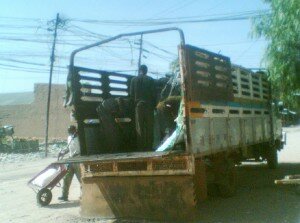Seeking alternatives to charcoal in Somaliland
 HARGEISA, 27 May 2009 (IRIN) – Insufficient cheaper alternatives and a large former refugee population are fuelling tree-felling and dependence on charcoal in the self-declared republic of Somaliland, adversely affecting the environment, say analysts.
HARGEISA, 27 May 2009 (IRIN) – Insufficient cheaper alternatives and a large former refugee population are fuelling tree-felling and dependence on charcoal in the self-declared republic of Somaliland, adversely affecting the environment, say analysts.
Most urban households use charcoal for everyday cooking. “We use a sack of charcoal every four days because our family is large,” said Zahra Omar, a mother of 12, in the capital, Hargeisa.
According to a 2007 study by the Academy for Peace and Development, more than 2.5 million trees are felled annually and burned for charcoal in Somaliland. The report stated that each household in Somaliland consumed an equivalent of 10 trees a month.
Deforestation exacerbates soil erosion and reduces rainfall availability. Trees are also important in carbon fixing – reducing the amount of carbon dioxide in the atmosphere.
Despite charcoal prices going up since 1991 with the resettlement of former refugees, demand remains high. “Before, 10 years ago, one sack of charcoal [cost] only 5,000 Somaliland shillings [US$0.76] but now here in Hargeisa it is about Sh30,000 [$5],” said Nimo Ahmed, a resident. “When [it] rains… charcoal [becomes] more expensive… because [the] trees become wet.”
Wood for energy
High and rising gas prices have also encouraged charcoal use. Previously, Nimo said, gas was cheaper than charcoal but the price has increased dramatically, with one litre of gas now costing about Sh4,000 ($0.61) up from Sh1,500 ($0.23).
It is the preferred fuel even in hotels, which consume even larger quantities of the commodity. “I use a sack of charcoal for a day’s cooking,” said Anab Mohamed Ismail, a Hargeisa chef.
According to researchers, one of the main drivers of deforestation in Africa is the need for fuel.
In sub-Saharan Africa only 7.5 percent of the rural population has access to electricity, according to a 2009 report on the state of the world’s forests. “As household incomes and investment in appropriate alternatives remain low, wood is likely to remain an important energy source in Africa in the coming decades…” it stated.
Forecasts made in 2001 suggested a 34 percent increase in wood fuel consumption from 2000 to 2020. “However, the rise in fuel prices in the past two years suggests that this increase is likely to be even greater. The share of wood fuel in the total energy supply is likely to decline, but the absolute number of people dependent on wood energy is predicted to grow,” it stated. “The forest situation in Africa presents enormous challenges, reflecting the larger constraints of low income, weak policies and inadequately developed institutions.”
“Charcoal… demand is increasing daily and burning [of] trees is increasing… but we are trying to [encourage] awareness among the people and give them other sources of income,” said Abdirisaq Bashir, the emergency and environment coordinator of Candlelight, an NGO working in environmental management. The NGO is helping young people become involved in alternative activities such as bee-keeping.
Trade ban
Local environmentalists are worried that the trade in charcoal may wipe out some tree species. “One of the … trees used for charcoal [production] is [the] Acacia bussei tree. Unfortunately its type is now going to be [extinct] in the Somaliland territories,” said Bashir. Each tree produces about eight to 10 sacks of charcoal.
Concerned with the impact of charcoal-burning on the environment, Hargeisa’s regional governor, Maroodi Jeeh, on 30 April banned trade in charcoal and the burning of trees.
Other attempts at protecting the environment have included the introduction of solar cookers and gas stoves in the main urban centres of Burou, Las-anod, Gabiley, Wajalea and Borama.
Since January, Somgas Company has been supplying gas to residents. “We have different gas cylinders [which] we sell… and train [the public on] how to use,” said Subeir Mouse Abdi of Somgas. An ordinary household uses an 11kg cylinder for six weeks, according to Abdi.
Although initial gas and cylinder prices are high, an 11kg gas cylinder and gas costs $44.50 and is recharged at $19. This, he said, is not expensive compared with the monthly charcoal consumption of about $15 for three 20kg sacks of charcoal per household. The gas cylinders range from 2-22kg.
“We now have 600 customers since we started in January,” he said.
While charcoal consumption fell in 2008 compared with 2007, there is still cause for concern, according to Somaliland’s Ministry of Pastoral Development and Environment.
“We are concerned [about the] environmental degradation caused by the charcoal, and we are working with several organisations to search [for] alternatives [to] charcoal energy,” said Mohamoud Ibrahim Mohamoud, head of the forestry section in the ministry. “The problem that increases… forest burning for charcoal is the poverty in the countryside and the high demand [for] charcoal energy in the urban [areas].”
maj/aw/mw
Comments
comments
 Calendar
Calendar







































